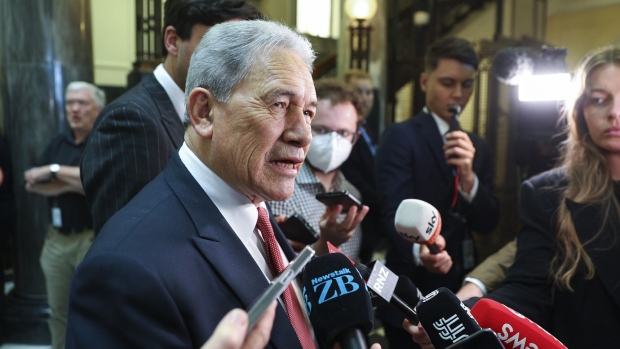Mar 27, 2024
New Zealand Expects China’s Respect As It Explores Joining Aukus
, Bloomberg News

(Bloomberg) -- New Zealand expects China to respect its right to an independent foreign policy as it explores joining the Aukus security pact between Australia, the US and UK, Foreign Minister Winston Peters said.
While Beijing has expressed concerns about Wellington signing up to Aukus, Peters said he doesn’t anticipate any threats to curtail trade from New Zealand’s largest export customer.
“I do not expect economic coercion from stating what they promised me we had a right to do — state our own independent foreign policy,” he said in an interview with Bloomberg late Wednesday in Wellington. “We’ve got a commitment out of them that they respect that. My response to China is you say you respect it and I trust you to respect it.”
Peters, who is also Deputy Prime Minister in New Zealand’s new center-right government, is moving the country closer to its traditional western partners such as the US. At the same time, he wants to maintain a strong relationship with China, the biggest buyer of New Zealand milk and log exports, and avoid the trade reprisals Australia suffered when it angered Beijing.
Aukus, which aims to counter China’s growing influence in the Indo-Pacific, involves London and Washington helping Canberra to field a fleet of nuclear-powered submarines. New Zealand has a nuclear-free policy and is only interested in pillar two of the pact, which relates to cooperation in strategically sensitive areas including quantum computing and artificial intelligence.
Peters and Defence Minister Judith Collins reaffirmed New Zealand’s interest in the pact in February, and since then Australian officials have been in Wellington for further discussions.
“Aukus is about looking after our own defense, playing our role,” Peters said. “It’s our business.”
Peters believes New Zealand has taken its western partners for granted and is aware of frustrations among members of the Five Eyes information-sharing alliance over the previous government’s reticence to criticize China on some issues of disagreement. He wants to be more responsive and decisive.
Cyber Attacks
That approach was on display this week, when Wellington coordinated with the US and UK in accusing China of sponsoring malicious cyber attacks on democratic institutions. It said a China-linked actor hacked some parliamentary systems in 2021, an assertion that the Chinese Embassy in Wellington dismissed as “groundless and irresponsible accusations” made via “megaphone diplomacy.”
China knows New Zealand is “a country that believes in two things, democracy and the rule of law, and above all the rule of law between nations,” Peters said. “They would know from our stance that we retain the right to say what we think and feel.”
That includes reiterating Wellington’s concerns over the territorial disputes in the South China Sea that potentially pose risks to key trade routes.
“We have made it clear to China that we expect them to respect UNCLOS,” Peters said, referring to the United Nations Convention on the Law of the Sea. “That’s been our position and that’s where we share a same view with a whole lot of countries.”
Peters, who recently hosted his Chinese counterpart Wang Yi in Wellington, said there is a special connection with China dating back to New Zealand’s early support for its accession to the World Trade Organization and being the first developed nation to sign a Free Trade Agreement with it in 2008.
But all the way through New Zealand has stressed its independent foreign policy, he said.
US Election
“We made it as clear as daylight,” Peters said. “We also wanted to have a clear understanding that we respect small island nations around us as being our equals, and we expect to be treated the same by larger countries around the world.”
New Zealand’s special relationship with its South Pacific neighbors has been highlighted in recent years as China has increased investment and diplomatic links in the region.
Peters said China had filled a void left by the US and other western nations who had neglected the Pacific, but welcomed more recent steps the US has taken to broaden its presence.
Peters is keen to foster further connections with the US, but wouldn’t be drawn on who he prefers to win the approaching presidential election.
“Any foreign minister who’s answered that question is not worth his or her own weight,” he said.
©2024 Bloomberg L.P.





